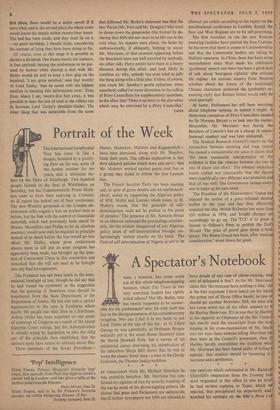Portrait of the Week
THE International Geophysical Year has come in like a dragon, heralded by a gratify- ing flare on the sun, some of the, hottest weather for ten years, and a television lec- ture by the Duke of Edinburgh. Two hundred people fainted in the heat at Wimbledon on Saturday, but the Commonwealth Prime Minis- ters seem to have been enjoying it. Certainly no ill report has leaked out of their conference. The new Western proposals at the London dis- armament talks suggest a ban on nuclear tests as before, but the link with the control of fissionable materials, which had previously been stated by Messrs. Macmillan and Dulles to be an absolute essential, would now only be required in principle instead of in detail before the ban would go into effect. Mr. Dulles, whose press conferences always seem to fall just as some progress has apparently been made, has brought up the ques- tion of Communist China in this connection and remarked that she will not need to be brought into any final arrangements.
The President has not been much in the inter- national limelight of late, though he did say that he had 'raised his eyebrows' at the suggestion that the granting of American visas should be transferred from the State Department to the Department of Justice. He has also sent a special representative to the area in Louisiana where nearly 300 people lost their lives in a hurricane. Arthur Miller has been acquitted on one count of contempt of Congress as a result of the recent Supreme Court rulings, but the Administration is already trying by legislation to take the sting out of the principle then established that the defence must have access to relevant secret files.
Three members of the Soviet Priesidium- Messrs. Malenkov, Molotov and Kaganovitch- have been dismissed, along with Mr. Shepilov, from their posts. The official explanation is that they adopted policies which were anti-party; that Mr. Molotov worked against peace; and that as a group they failed to follow the true Leninist line.
The French Socialist Party has been meeting and, in spite of grave doubts and an intellectuals' revolt, ended by supporting the Algerian policy of MM. Mollet and Lacoste which states, in M. Mollet's words, that 'the principle of self- determination must not be pushed to the point of paradox.' The presence of Mr. Aneurin Bevan as an observer enlivened the proceedings consider- ably, for his evident disapproval of any Algerian policy short of self-determination brought em- barrassingly violent attacks on his head. The Federal self-determination of Nigeria is not to be allowed yet awhile according to the report on the constitutional conference in London, though the East and West Regions are to be self-governing.
The first travellers to use the new Russian motoring facilities have pierced the Iron Curtain. So has news that there is unrest in Czechoslovakia and that the Communist leaders are taking to Stalinist measures. In China there has been some retrenchment since Mao made his celebrated 'gardening' speech and there has been a good deal of talk about 'bourgeois rightists' who criticise the regime. An anxious inquiry from Western scholars about the future of the traditional Chinese characters produced the (probably) re- assuring reply that Roman letters would only be used sparingly.
At home, Parliament has still been worrying about telephone tapping, as indeed it might. A three-man committee of Privy Councillors headed by Sir Norman Birkett is to look into the matter. Meanwhile Mr. Marrinan was facing the Benchers of Lincoln's Inn on a charge of unpro- fessional conduct and was later disbarred.
The Medical Research Council's report on the connection between smoking and lung cancer has caused a considerable stir since it claims that 'the most reasonable interpretation of the evidence is that the relation between the two is one of cause and effect.' The tobacco manufac- turers replied not unnaturally that the figures were capable of a very different interpretation and that all was well. The Government invited every• one to make up his own mind.
The President of the Mineworkers' Union has rejected the notion of a price tribunal mooted. earlier in the year and has thus effectively scotched the idea. British Railways lost more than £16 million in 1956, and freight charges are accordingly to go up. The TUC is to grant a licence to Odham's Press to publish the Daily Herald. The price of petrol goes down a half. penny. The Home Guard has been, after 'anxious consideration,' stood down for good.














































 Previous page
Previous page